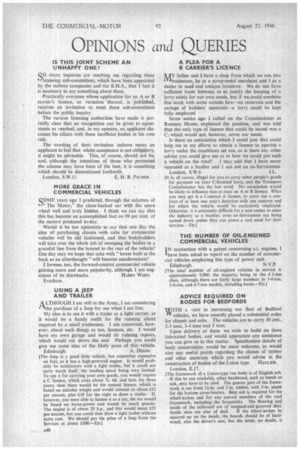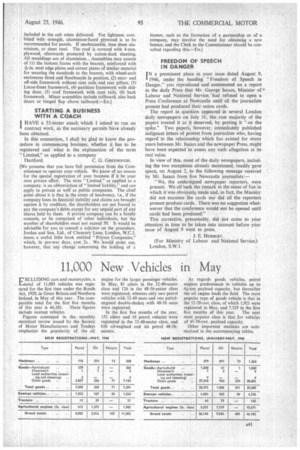OPINIONS and QUERIES IS THIS JOINT SCHEME AN UNHAPPY ONE?
Page 42

Page 45

If you've noticed an error in this article please click here to report it so we can fix it.
qo many inquiries are reaching me regarding these "licensing sub-committees, which have been appointed by the railway companies and the R.H.A., that I feel it is necessary to say something about them.
Practically everyone whose application for an A or B carrier's licence, or variation thereof, is published, receives an invitation to meet these sub-committees before the public inquiry.
The various licensing authorities have made it perfectly clear that no recognition can be given to agreements so reached, and, in my opinion, an applicant discusses his affairs with these unofficial bodies at his own risk.
The wording of their invitation induces many an applicant to feel that whilst acceptance is not obligatory, it might be advisable. This, of course, should not be, and, although the intentions of those who promoted the scheme may have been of the best, it is something which should be discontinued forthwith.
London, S.W.11 E. H. B. PALMER. MORE GRACE IN
COMMERCIAL VEHICLES
SOME years ago I predicted, through the columns of
"The Motor," the clean-backed car with the spare wheel well and truly hidden. I think we can say that this has become an accomplished fact on 99 per cent. of the motors produced to-day.
Would it be too optimistic to say that one day the idea of purchasing chassis with cabs for commercial vehicles will be old fashioned, and that bodybuilders will take over the whole job of sweeping the bodies in a graceful line from the bonnet to the rear of the vehicle? One day may we hope that -cabs with " boxes built at the back as an afterthought" will become anachronisms?
I foresee, too, the forward-control commercial vehicle gaining more and more popularity, although I am cog
nizant of its drawbacks. HARRY WARD. Evesham.
USING A JEEP AND TRAILER
ALTHOALTHOUGH I am still in the Army, I am considering UGH purchase of a Jeep for use when I am free. My idea is to use it with a trailer as a light carrier, as it would be a handy outfit for the running about required by a small tradesman. I am concerned, however, about such things as tax, licences, etc. I would have my own garage and would do running repairs, which would cut down the cost Perhaps you could give me some idea of the likely price of this vehicle.
Edinburgh. A. DIXON. [The Jeep is a good little vehicle, but somewhat expensive on fuel, as it has a high-powered engine. It would probably be satisfactory with a light trailer, but it could not carry much itself, the loading space being very limited. To use it for carrying your own goods, you would require a C licence, which costs about 7s. 6d. and lasts for three years; then there would be the annual licence, which is based on unladen weight and would amount to about £15 per annum, plus £10 for the right to draw a trailer. If, however, you were able to license it as a car, the tax would be based on horse-power and would be much greater. The engine is of about 20 h.p., and this would mean £25 per annum, but you could then draw a light trailer without extra cost. We should put the price of a Jeep from the Services at about L300.—Eo.]
A PLEA FOR A B CARRIER'S LICENCE
NAY father and I have a shop from which we run two "'businesses, he as a scrap-metal merchant and I as a dealer in used and antique furniture. We do not have sufficient trade between us to justify the keeping of a lorry solely for our own needs, but if we could combine this work with some outside hire—on removals and the cartage of builders' materials—a lorry could be kept fully employed
Some weeks ago I called on the Commissioner at Romney House, explained the position, and was told that the only type of licence that could be issued was a C, which would not, however, cover our needs.
Is there an association which I could join that could help me in my efforts to obtain a licence to operate a lorry under the conditions set out, or is there any other advice you could give me as to how we could put such a vehicle on the road? I may. add that I have never operated as a haulier and I am not an ex-Serviceman.
London, S.W.6 J.L.
[It is, of course, illegal for you to carry other people's goods for payment on your C-licensed lorry, and the Transport Commissioner has the last word. No association would be likely to influence him to issue an A dr B licence. What you may get is a Contract A licence, to carry out a contract of at least one year's duration with one concern and for which the vehicle would be exclusively employed. Otherwise, it is extremely difficult for a new-corner to enter the industry as a haulier; even ex-Servicemen are being turned down unless they can prove a real need for their services.—Ea.] THE NUMBER OF OIL-ENGI NED COMMERCIAL VEHICLES TN connection with a patent concerning c.i. engines, I 'have been asked to report on the number of commercial vehicles employing this type of power unit.
Edinburgh. N.V.P.
[The total number of oil-engined vehicles in service is approximately 9,000, the majority being in the 4 5-ton class, although there are fairly large numbers in 3-4-ton, 5-6-ton, and 6-7-ton models, including buses.—ED.) ADVICE REQUIRED ON BODIES FOR BEDFORDS WITH a view to increasing our fleet of Bedford YY vehicles, we have recently placed a substantial order for chassis and cabs. The vehicles are to carry 30 cwt., 2-3 tons, 3-4 tons and 5 tons.
Upon delivery of these we wish to build on them fabricated bodies, and would appreciate any assistance you can give us in this matter. Specification details of body construction would be most welcome, as would also any useful points regarding the classes of timber and other materials which you would advise in the
construction of bodies of the Luton type. HAULIER. London, E.17.
[The framework of a Luton-type van body is of English ash. If this be not available, other hardwood, such as beech or oak, may have to be used. The greater part of the framework is cut from 11-in. and 2-in, timber, with 3-in, plank for the bottom cross-bearers. Bent ash is required for the wheel-arches and for any curved members of the roof framework, including the hoopsticks. The flooring and inside of the tailboard are of tongued-and-grooved deal. Inside slats are also of deal. If the wheel-arches be squared up on the inside, the boards should be of hardwood, also the driver's seat, but the latter, no doubt, is
included in the cab when delivered. For lightness, coin bined with strength, aluminium-faced plywood is to be recommended for panels. If unobtainable, then sheet aluminium, or sheet steel. The roof is covered with 4-mm. plywood, afterwards protected by cotton-duck sheeting. All mouldings are of aluminium,. Assemblies may consist of (1) the bottom frame with the bearers, reinforced with
steel edge plates and corner plates of similar material for securing the standards to the bearers, with wheel-arch enclosures fitted and floorboards in position, (2) nearand off-side framework without cant rails and rear pillars, (3) Luton-front framework, (4) partition framework with sliding door, (5) roof framework with cant rails, (6) back framework. Minor assemblies include tailboard, also back doors or hinged flap above tailboard.--E.D.1 STARTING A BUSINESS WITH A COACH HAVE a 32-seater coach which I intend to run on I contract work, as the necessary permits have already been obtained.
In this connection, I shall be glad to know the procedure in commencing business, whether it has to be registered and what is the explanation of the term "Limited," as applied to a company Dartford. C. G. GREENOUGH.
[We presume that you have full permission from the Commissioner to operate your vehicle. We know of no reason for the special registration of your business if it be your own private affair. The term "Limited," as applied to a company. is an abbreviation of" limited liability," and can apply to private as well as public companies. The chief point about it is that in the event of insolvency, i.e., if the company loses its financial stability and claims are brought against it by creditors, the shareholders are not forced to pay the company's debts except for any unpaid part of any shares held by them. A private company can be a family conceit, or be comprised of other individuals, but the number of shareholders must not exceed 50. It would be advisable for you to consult a solicitor on the procedure. Jordan and Son. Ltd., of Chancery Lane, London, W.C.2. issues a useful little book entitled "Private Companies," which, in pre-war days, cost 2s. We 'would point out, however, that any change concerning the holding of a
licence, such as the formation of a partnership or of a company, may involve the need for obtaining a new licence, and the Clerk to the Commissioner should be consulted regarding this.—Fo.1 FREEDOM OF SPEECH 1N DANGER
IN a prominent place in your issue dated August 9, 1 1946, under the heading "Freedom of Speech in Danger," you reproduced and commented on a report in the daily Press that Mr. George Isaacs, Minister of • Labour and National Service, had refused to open a Press Conference at Newcastle until all the journalists present had produced their union cards.
The report in question appeared in several London daily newspapers on July 31; the vast majority of the papers treated it as it deserved, by putting it " on the spike." Two papers, however, immediately published indignant letters of protest from journalists who, having regard to the relationship which has existed for many years between Mr. Isaacs and the newspaper Press, might have been expected to assess any such allegation at its real value.
In view of this, most of the daily newspapers, including the two exceptions already mentioned, readily gave space, on August 2, to the following message received by Mr. Isaacs from five Newcastle journalists:— " We, the undersigned newspaper reporters, were present We all took the remark in the sense of fun in which it was obviously, made and, in fact, the Minister did not examine the cards nor did all the reporters present produce cards. There was no suggestion whatsoever that the conference would not be opened until cards had been produced."
This corrective, presumably, did not come to your attention in time to be taken into account before your issue of August 9 went to press.
J. E. HERBERT.
(For Ministry of Labour and National Service:) London, S.W.1.




































































